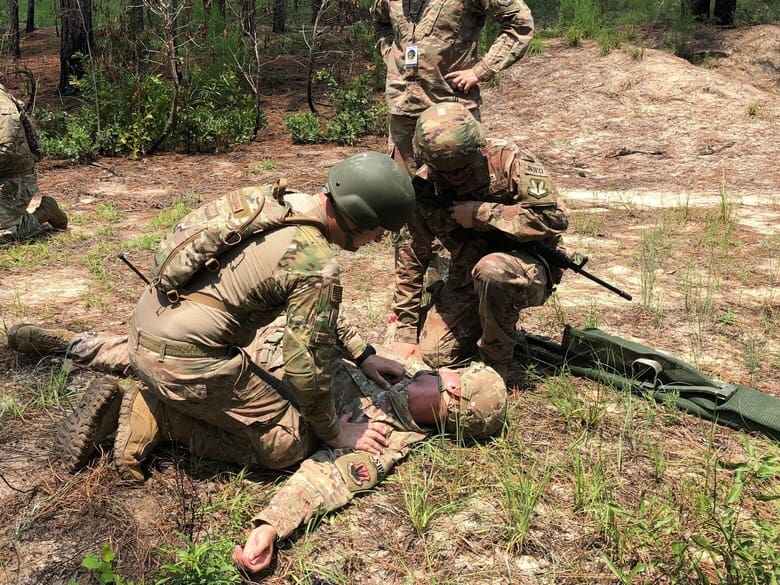An organizational vision provides direction and unites a team by illustrating the future of that team. For the “Mighty” 18th Weather Squadron our new vision is, “Integrating Environmental Supremacy to Win Our Nation’s Wars.” To accomplish that vision, guided by Squadron Commander Lt. Col. James C. Caldwell, the men and women of the 18th WS, who have been fighting in the War on Terror for nearly two decades, now look to the future.

Stationed all along the eastern seaboard of the United States in nine geographically separated units, the Total Force Airmen of the Mighty 1-8 support the conventional Army units of the XVIII Airborne Corps and subordinate divisions, both in-garrison and across the globe. Headquartered at Pope Army Airfield, North Carolina, the 18th WS produces some of the world’s most elite Army Weather Support forecasters, also known as Staff Weather Officers.
While a vision provides the team’s direction, a mission statement provides the “how.” The 18th WS mission statement is to “Train and Equip Courageous, Credible, and Combat-Ready Army Weather Support Airmen.” The most critical component of that mission statement is training. Before 18th WS SWOs are ready for deployment, they must attend a number of different formal training courses, such as the Army Weather Support Course and Evasion and Conduct After Capture. Additionally, SWOs must also complete Airfield Qualification Training and M4 Carbine and M9 Pistol qualification, and provide weather support in both Army and Air Force training and certification exercises.
Some of the more robust exercises in which SWOs participate are at the Joint Readiness Training Center in Louisiana and the National Training Center in California, but SWOs also support live-fire exercises and aircraft gunnery exercises. These exercises prepare the Army, and our embedded SWOs, for current and future warfare. In addition, each geographically separated unit conducts local exercises with supported Army units, including Unmanned Aerial System weather support, but the training does not stop there.
At the 18th WS, SWOs may also have the opportunity to become a paratrooper by attending the Army Basic Airborne Course, or train on aircraft orientation, sling-load operations, and rappelling and fast-rope techniques at Air Assault School. If motivated enough, a SWO may also earn the Pathfinder badge by learning dismounted navigation, and establishing and operating helicopter landing zones and parachute drop zones. To fully embed with our Army units, SWOs require these extra skills when the call comes for accurate environmental predictions.
As a capstone to their training, SWOs must complete an annual, unilateral combat mission readiness evaluation called the Expeditionary Field Evaluation Exercise (EFEX). During the EFEX, SWOs are evaluated on all AWS training items, including land navigation, tactical visibility charts, field condition manual observations, convoy procedures, evaluating and transporting a casualty, Tactical Meteorological Observing System operations, AWS mission weather briefs, and many other tasks. Upon successful completion of the EFEX, SWOs are then certified to execute the mission downrange.
While the basis of effective weather support is accurate, timely and relevant weather products, SWOs go far beyond this. SWOs must tailor products to best support command and control, identifying potential environmental impacts to friendly and enemy forces, while providing means to mitigate or exploit conditions to the advantage of friendly forces or disadvantage of enemy forces. Being able to equip decision-makers with decision-grade intelligence to accomplish mission objectives is what truly separates a SWO from a weather forecaster.
Despite the grinding deployment schedule over the last 20 years, our mission is now changing. The Airmen and families of the Mighty 1-8, guided by the renewed vision and mission statements mentioned above, must accept the current state of global affairs. No longer do we have to solely prepare for counterinsurgency operations, rather, following in the footsteps of the Army, we’re bending our focus each day more towards the high-end fight. State-on-state warfare, as outlined in the National Defense Strategy and the Air Force Weather Functional Concept of Operations, requires a deeper look at our ability to shoot, move and communicate on the battlefield.
Our culture is shifting away from traditional thinking to answer non-traditional requirements that encompass the entire scope of the environment, from the bottom of the ocean to the reaches of space. There’s no doubt that the victor in the next big war will require every advantage, especially those found in Mother Nature. We take this obligation seriously and know full well that the Mighty 1-8 is required for victory. We must be ready! – “All The Way!”
By SMSgt Patrick Brennan and Miguel Rosado, 18th Weather Squadron, 93d Air Ground Operations Wing Public Affairs


I’m sure these guys are really elite and all that but I had to giggle when they used JRTC and NTC exercises as examples of their “feats of strength “. Any Joe can tell you it’s gonna be unbearably hot and wet in JRTC and unbearably hot and dry at NTC unless it’s winter and then it gonna be freezing cold and dry?. I just picture the Div CG turning towards his weatherman andvasking fornthe forecast for Louisiana in Aug. The weather man turns to his laptop and charts for several tense minutes and then declares it will be high 90’s with matching humidity.